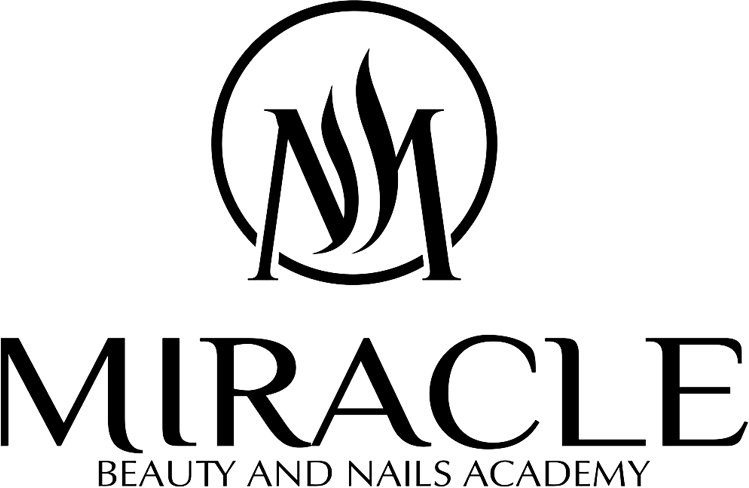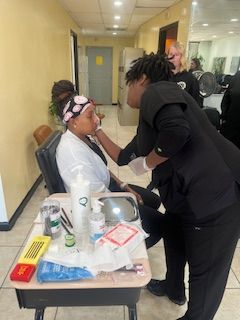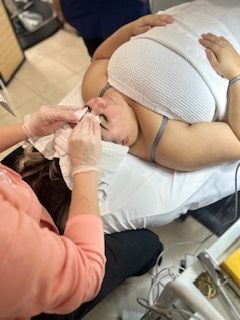Pre-Requisite: Students must have completed the Esthetics or Master Esthetics course and have obtained the applicable license.
The Esthetics Instructor course teaches students how to be a professional instructor in the Esthetics field. They learn to identify the characteristics of their students as well as different learning abilities. Students will also learn to write lesson plans, design tests, study guides, and worksheets. In addition, they will grade tests and learn how to properly maintain students’ records.
Upon completion of the course, students will receive a certificate of completion, and will qualify to become licensed as an Esthetics Instructor. The state of Virginia currently does not require CEUs to maintain license. The license must be renewed every two years by paying the necessary fee. The school works on clock hours and the total tuition is based on the cost of the course and not credit hours
OBJECTIVES
Upon completion of the course requirements, the determined graduate will be able to:
- Project a positive attitude and a sense of personal integrity and self-confidence.
- Project professionalism, visual poise, and proper grooming.
- Communicate effectively and interact appropriately with colleagues, supervisors, and clients. Educate students in the field of esthetics on hair removal, skin care and makeup.
- To ensure continued career success, the graduate will continue to learn new and current information related to skills, trends, and methods for career development in Esthetics instructor and related fields.
REFERENCES
A comprehensive library of references, periodicals, books, texts, audio/video tapes and web-based materials are available to support the program of study and supplement the program of study. Students should avail themselves of the opportunity to use these extensive materials.
Length of Program
Part time Monday – Friday 5pm- 9pm (20 hours per week/40 weeks), Full Time Monday- Friday 9am -5pm (35 hours per week/18 weeks), Full Time Monday – Thursday 9am – 3pm (22 hours per week/28weeks), Full Time Monday – Thursday 9am -5pm (28 hours per week/22 weeks)
Holidays and School Closings
NEW YEAR’S DAY, Martin Luther King Jr., Presidents Day, Spring Break, Memorial Day, Juneteenth, Summer Break, Independence Day, Labor Day, Indigenous People Day, Thanksgiving Break, Christmas Break
TEACHING AND LEARNING METHODS
The clock hour education is provided through a sequential set of learning steps which address specific tasks necessary for state board preparation, graduation, and job entry level skills. Clinic equipment, implements, and products are comparable to those used in the industry. Each student will receive instruction that relates to the performance of useful, creative, and productive career-oriented activities. The course is presented through comprehensive lesson plans which reflect effective educational methods. Subjects are presented by means of interactive lectures, demonstration, cooperative learning, labs, student salon activities, and student participation. Audio-visual aids, projects, activities, and other related learning methods are used in the course.
GRADING PROCEDURES
The qualitative element used to determine academic progress is a reasonable system of grades as determined by assigned academic learning. Students are assigned academic learning and a minimum number of practical experiences. Academic learning is evaluated after each unit of study. Practical assignments are evaluated as completed and counted toward course completion only when rated as satisfactory or better (the computer system will reflect completion of the practical assignment as a 100% rating). If the performance does not meet satisfactory requirements, it is not counted, and the performance must be repeated. At least two comprehensive practical skills evaluations will be conducted during the study. Practical skills are evaluated according to text procedures and set forth in practical skills evaluation criteria adopted by the school. Students must maintain a written grade average of 75% and pass a FINAL written and practical exam prior to graduation. Students must make up for failed or missed tests and incomplete assignments. Numerical grades are considered according to the following scale:
93 - 100 ------------- EXCELLENT
85 - 92 --------------- VERY GOOD
75 - 84 --------------- SATISFACTORY
74 and BELOW --- UNSATISFACTORY
Esthetics Instructor
400 hours
School Orientation (1 hour)
1. Orientation (24 hours)
a. school policies
b. qualifications and characteristics of a master educator
c. constant pursuit of knowledge
d. effective time management and organized work methods
2. Curriculum (25 hours)
a. desired performance goals
b. profile of the master educator
c. education relationships
d. developing a dynamic program of study.
3. Course Outline and Development (10 hours)
4. Lesson Planning (10 hours)
a. desired performance goals
b creating lesson plans
c. developing monthly calendars.
5. Classroom Management (10 hours)
a. desired performance goals
b. managing the atmosphere.
c. considers the environment.
d. adult learner characteristics
e. student demographics
f. teaching material
6. Teaching Techniques (15 hours)
a. desired performance goals
b. history of teaching
c. manual facials and treatments
d. machine, electrical facials, and treatments
e. general procedures and safety measure
7. Methods of instruction (15 hours)
a. desired performance goals
b. group discussion
c. role playing
d. window paning
e. mind mapping
f. visualization
g. workbooks and partially complete handouts.
h. mnemonics
i. games, group, synergy, and competitions
8. Learning Styles (20 hours)
a. learning style profiles
b. multiple intelligence
c. verbal/linguistic intelligence
d. logical/mathematical intelligence
e. intrapersonal intelligence
f. bodily/kinesthetic intelligence
g. interpersonal intelligence
h. musical/rhythmic intelligence
i. naturalist intelligence
j. how to identify preferred intelligences.
h. developing intelligence.
i. combining intelligence.
9. Learning Disabilities (3 hours)
a. special needs accessibility
10. Teaching Aids (3 hours)
a. developing and using educational aids.
b. why use educational aids and technology
11. Developing, administering, and grading examinations (5 hours)
a. desired performance goals
b. teaching testing skills
c. preparing for the test.
d. on test day
e. deductive reasoning
f. test taking strategies.
g. educator strategies
12. School Administration (3 hours)
a. desired performance goals
b. employee handbook
c. what’s in the grade?
d. what to grade?
e. sample grading procedures
f. when to grade.
13. Recordkeeping (3 hours)
a. desired performance goals
b. importance of recordkeeping
c. purchase and inventory records
d. service records
e. the front desk
f. booking appointments
g. use of the telephone in the school
h. incoming phone calls
i. booking appointments by phone
j. handling complaints by telephone
k. Selling in the school.
l. promoting the student salon in the community.
14 Laws and Regulations (3 hours)
a. va laws and regulations
15. Presentation of theoretical subjects (50 hours)
a. communication skills
b. C R E A T E
c. what makes a powerful presentation?
d. powerful openings
e. building powerful content
16. Presentation of practical subjects (50 hours)
a. desired performance goals
b interactive lecture
c. demonstration and practice
d. equipment
e. supplies
17. Supervision of clinic floor: and (100 hours) desired performance goals
a. desired performance goals
b. student salon teaching
c. the three elements of zone teaching
d. supervising multiple students
e. tools of the educator
18. Practicum Teaching (50 hours)
a. desired performance goals
b. practical skills training
c. student salon philosophy
d. the essence of teamwork
e. what does the public see?
f. the warm reception
g. high-tech, high touch safety
h. recordkeeping requirements
i. the efficient dispensary
j. cultivating satisfied clients.
k. recognizing new clients.
l. tender, loving client care
m. interacting with clients
n. building a successful clientele.
o. rebooking clients for future services
p. encouraging repeat clients.
r. upgrading client tickets
Disclaimer- Miracle Beauty and Nails Academy DOES NOT accept payment via email. We only accept personal and confidential information in person. Please reach out if you have any questions in relation to this matter
(757) 368-3344






